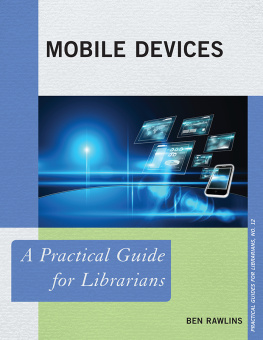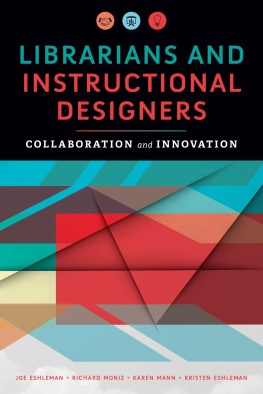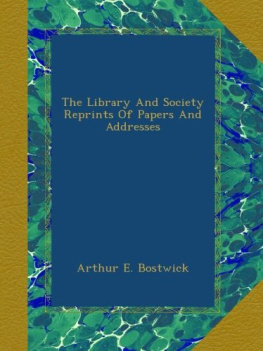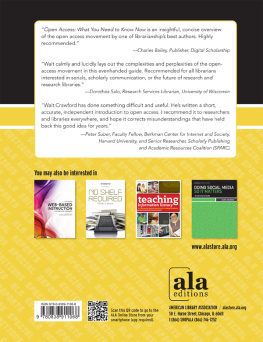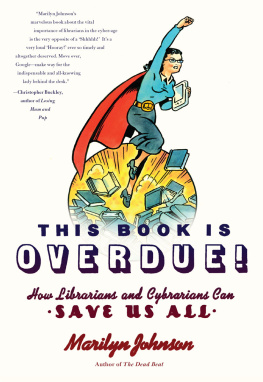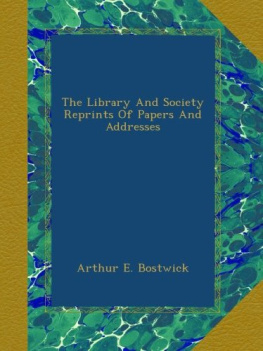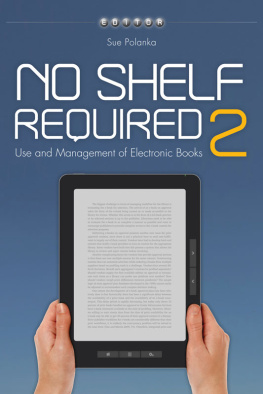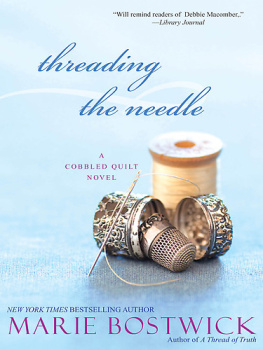E Arthur Bostwick - A Librarians Open Shelf
Here you can read online E Arthur Bostwick - A Librarians Open Shelf full text of the book (entire story) in english for free. Download pdf and epub, get meaning, cover and reviews about this ebook. year: 2007, publisher: IndyPublish.com, genre: Romance novel. Description of the work, (preface) as well as reviews are available. Best literature library LitArk.com created for fans of good reading and offers a wide selection of genres:
Romance novel
Science fiction
Adventure
Detective
Science
History
Home and family
Prose
Art
Politics
Computer
Non-fiction
Religion
Business
Children
Humor
Choose a favorite category and find really read worthwhile books. Enjoy immersion in the world of imagination, feel the emotions of the characters or learn something new for yourself, make an fascinating discovery.
- Book:A Librarians Open Shelf
- Author:
- Publisher:IndyPublish.com
- Genre:
- Year:2007
- Rating:3 / 5
- Favourites:Add to favourites
- Your mark:
- 60
- 1
- 2
- 3
- 4
- 5
A Librarians Open Shelf: summary, description and annotation
We offer to read an annotation, description, summary or preface (depends on what the author of the book "A Librarians Open Shelf" wrote himself). If you haven't found the necessary information about the book — write in the comments, we will try to find it.
A Librarians Open Shelf — read online for free the complete book (whole text) full work
Below is the text of the book, divided by pages. System saving the place of the last page read, allows you to conveniently read the book "A Librarians Open Shelf" online for free, without having to search again every time where you left off. Put a bookmark, and you can go to the page where you finished reading at any time.
Font size:
Interval:
Bookmark:
Project Gutenberg's A Librarian's Open Shelf, by Arthur E. Bostwick
This eBook is for the use of anyone anywhere at no cost and with
almost no restrictions whatsoever. You may copy it, give it away or
re-use it under the terms of the Project Gutenberg License included
with this eBook or online at www.gutenberg.net
Title: A Librarian's Open Shelf
Author: Arthur E. Bostwick
Release Date: September 10, 2004 [EBook #13430]
Language: English
*** START OF THIS PROJECT GUTENBERG EBOOK A LIBRARIAN'S OPEN SHELF ***
Produced by Ted Garvin, Barbara Tozier and the Online Distributed
Proofreading Team.
1920
The papers here gathered together represent the activities of a librarian in directions outside the boundaries of his professional career, although the influences of it may be detected in them here and there. Except for those influences they have little connection and the transition of thought and treatment from one to another may occasionally seem violent. It may, however, serve to protect the reader from the assaults of monotony.
A.E.B.
| Do Readers Read? |
| (The Critic, July, 1901, p. 67-70) |
| What Makes People Read? |
| (The Book Lover, January, 1904, p. 12-16) |
| The Passing of The Possessive; A Study of Book Titles |
| (The Book Buyer, June, 1897, p. 500-1) |
| Selective Education |
| (Educational Review, November, 1907, p. 365-73) |
| The Uses of Fiction |
| Read before the American Library Association, Asheville Conference, May 28, 1907. (A.L.A. Bulletin, July, 1907, p. 183-7) |
| The Value of Association |
| Delivered before the Library Associations of Iowa, Nebraska, Kansas, Missouri, Indiana and Ohio, October 9-18, 1907. (Library Journal, January, 1908, p. 3-9) |
| Modern Educational Methods |
| (Notes and News, Montclair, N.J., July, 1908) |
| Some Economic Features of Libraries |
| Read at the opening of the Chestnut Hill Branch, Philadelphia Free Library, January 22, 1909. (Library Journal, February, 1909, p. 48-52) |
| Simon Newcomb: Americas Foremost Astronomer |
| (Review of Reviews, August, 1909, p. 171-4) |
| The Companionship of Books |
| Read before the Pacific Northwest Library Association, June, 1910. (P.N.W.L.A. Proceedings, 1910, p. 8-23) |
| Atomic Theories of Energy |
| Read before the St. Louis Academy of Science. (The Monist, October, 1912, p. 580-5) |
| The Advertisement of Ideas |
| (Minnesota Library Notes and News, December, 1912, p. 190-7) |
| The Public Library, The Public School, and The Social Center Movement |
| Read before the National Education Association. (N.E.A. Proceedings, 1912, p. 240-5) |
| The Systematization of Violence |
| (St. Louis Mirror, July 18, 1913) |
| The Art of Re-reading |
| History and Heredity |
| Read before the New England Society of St. Louis. (New England Society of St. Louis. Proceedings, 29th year, p. 13-20) |
| What The Flag Stands For |
| A Flag Day address in St. Peters church, St. Louis. (St. Louis Republic, June 15, 1914) |
| The Peoples Share in The Public Library |
| Read before the Chicago Womens Club, January 6, 1915. (Library Journal, April, 1915, p. 227-32) |
| Some Tendencies of American Thought |
| Read before the New York Library Association at Squirrel Inn, Haines Falls, September 28, 1915. (Library Journal, November, 1915, p. 771-7) |
| Drugs and The Man |
| A Commencement address to the graduating class of the School of Pharmacy, St. Louis, May 19, 1915. (Journal of the American Pharmaceutical Association, August, 1915, p. 915-22) |
| How The Community Educates Itself |
| Read before the American Library Association, Asbury Park, N.J., June 27, 1916. (Library Journal, August, 1916, p. 541-7) |
| Clubwomens Reading |
| (The Bookman, January-March, 1915, p. 515-21, 642-7, 64-70) |
| Books For Tired Eyes |
| (Yale Review, January, 1917, p. 358-68) |
| The Magic Casement |
| Read before the Town and Gown Club, St. Louis. |
| A Word to Believers |
| Address at the closing section of the Church School of Religious Instruction. |
| Index |
Return to Table of Contents
Those who are interested in the proper use of our libraries are asking continually, What do readers read? and the tables of class-percentages in the annual reports of those institutions show that librarians are at least making an attempt to satisfy these queries. But a question that is still more fundamental and quite as vital is: Do readers read at all? This is not a paradox, but a common-sense question, as the following suggestive little incident will show. The librarian-in-charge of a crowded branch circulating-library in New York City had occasion to talk, not long ago, to one of her star borrowers, a youth who had taken out his two good books a week regularly for nearly a year and whom she had looked upon as a modelso much so that she had never thought it necessary to advise with him regarding his reading. In response to a question this lad made answer somewhat as follows: Yes, maam, Im doing pretty well with my reading. I think I should get on nicely if I could only once manage to read a book through; but somehow I cant seem to do it. This boy had actually taken to his home nearly a hundred books, returning each regularly and borrowing another, without reading to the end of a single one of them.
That this case is not isolated and abnormal, but is typical of the way in which a large class of readers treat books, there is, as we shall see, only too much reason to believe.
The facts are peculiarly hard to get at. At first sight there would seem to be no way to find out whether the books that our libraries circulate have been read through from cover to cover, or only half through, or not at all. To be sure, each borrower might be questioned on the subject as he returned his book, but this method, would be resented as inquisitorial, and after all there would be no certainty that the data so gathered were true. By counting the stamps on the library book-card or dating-slip we can tell how many times a book has been borrowed, but this gives us no information about whether it has or has not been read. Fortunately for our present purpose, however, many works are published in a series of volumes, each of which is charged separately, and an examination of the different slips will tell us whether or not the whole work has been read through by all those who borrowed it. If, for instance in a two-volume work each volume has gone out twenty times, twenty borrowers either have read it through or have stopped somewhere in the second volume, while if the first volume is charged twenty times and the second only fourteen, it is certain that six of those who took out the first volume did not get as far as the second. In works of more than two volumes we can tell with still greater accuracy at what point the readers interest was insufficient to carry him further.
Font size:
Interval:
Bookmark:
Similar books «A Librarians Open Shelf»
Look at similar books to A Librarians Open Shelf. We have selected literature similar in name and meaning in the hope of providing readers with more options to find new, interesting, not yet read works.
Discussion, reviews of the book A Librarians Open Shelf and just readers' own opinions. Leave your comments, write what you think about the work, its meaning or the main characters. Specify what exactly you liked and what you didn't like, and why you think so.


